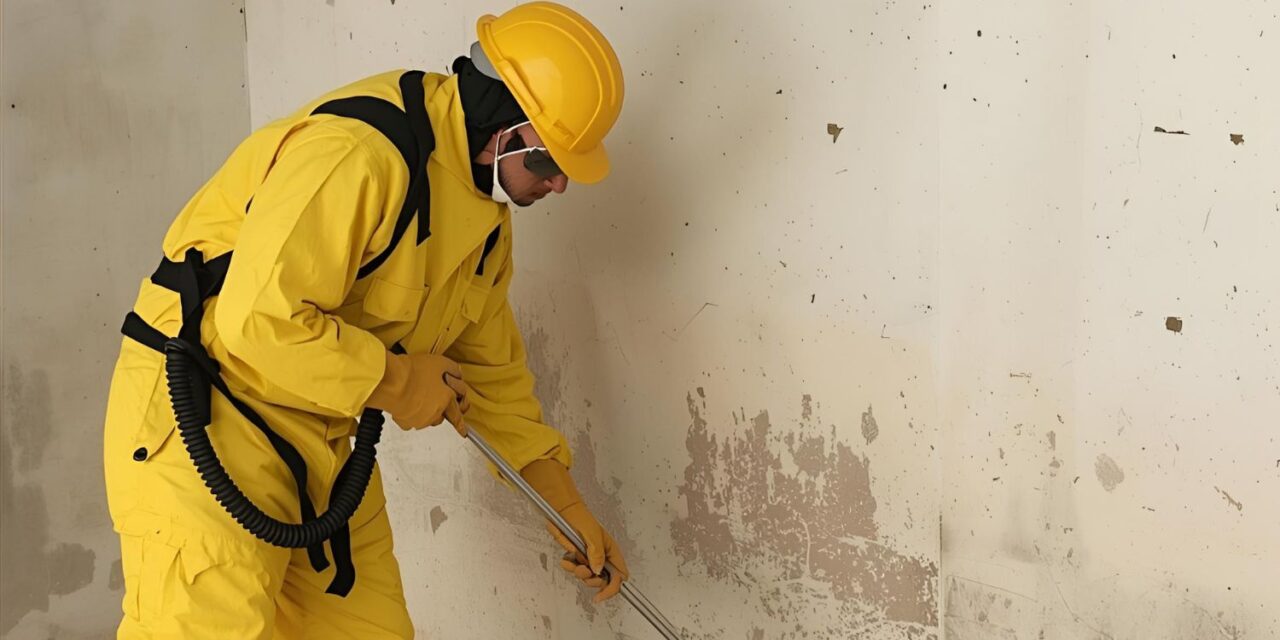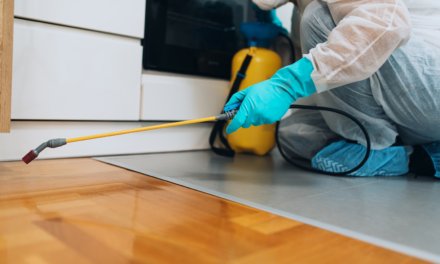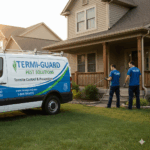Key Takeaways
- Pests are an unseen threat that can significantly damage a business’s reputation, finances, and operational stability in Delhi NCR.
- Effective pest control services Delhi are a critical investment, not a luxury, for maintaining business integrity and public health.
- Commercial pest control faces unique challenges due to diverse environments, the need for discretion, and the sheer scale and complexity of properties.
- Integrated Pest Management (IPM) is the gold standard, offering a sustainable, cost-effective, and environmentally responsible approach.
- Compliance with regulations like FSSAI and local municipal by-laws is mandatory, and professional pest control helps businesses meet these critical obligations.
- Choosing reliable pest control companies for offices involves assessing expertise, adherence to IPM, safety protocols, and regulatory knowledge.
Table of Contents
- Unlocking Business Security: Premier Pest Control Services Delhi for Commercial Success
- Key Takeaways
- The Unseen Threat: Impact of Pests on Commercial Operations in Delhi NCR
- Unique Challenges of Commercial Pest Control Across Delhi NCR’s Diverse Business Landscape
- The Gold Standard: Embracing Integrated Pest Management (IPM) for Sustainable Business Protection
- Navigating Regulations: Compliance and Best Practices for Commercial Spaces in Delhi NCR
- Choosing Your Partner: What to Look for in Reliable Pest Control Companies for Offices and Commercial Spaces in Delhi NCR
- Conclusion: Safeguard Your Business with Expert Pest Control in Delhi NCR
- Frequently Asked Questions
Pests are more than just a nuisance; they are an unseen threat that can quietly undermine the foundations of any business. In the vibrant, fast-paced commercial world of Delhi NCR, where competition is fierce and reputation is everything, ignoring pest issues is a risk no company can afford to take. Effective pest control services Delhi are not just a luxury; they are a critical investment for maintaining operational integrity, protecting public health, and safeguarding your brand’s reputation.
This comprehensive guide is designed to walk businesses through the unique challenges posed by pests in the Delhi NCR region. We will explore the impacts pests have, the specific difficulties of commercial pest management, and the unparalleled benefits of choosing integrated pest control solutions Delhi NCR. Whether you’re seeking reliable pest control companies for offices, warehouses, bustling retail spaces, or any other commercial establishment across Delhi, Noida, and Gurgaon, this information will equip you to make informed decisions and ensure your business remains secure and thriving.
The Unseen Threat: Impact of Pests on Commercial Operations in Delhi NCR
Pests in a commercial setting are not merely an annoyance; they pose significant threats that can have far-reaching and detrimental consequences for any business. From small enterprises to large corporations, the presence of these unwelcome guests can severely impact a company’s financial stability, the health and safety of its occupants, and its ability to comply with essential regulations. Understanding these impacts is the first step toward appreciating the indispensable role of professional pest control services Delhi.
A. Economic Consequences of Infestations
Pest infestations lead to substantial financial losses for commercial establishments across Delhi NCR. These losses manifest in various ways, often accumulating silently until they become unmanageable.
-
- Damage to Inventory, Infrastructure, and Raw Materials: Pests, particularly rodents and termites, are notorious for causing physical damage. Rodents, such as rats and mice, can gnaw through electrical wiring, leading to power outages, equipment malfunctions, and even fire hazards. This can result in costly repairs and replacements of vital infrastructure. Termites, often called “silent destroyers,” can severely compromise the structural integrity of buildings by feasting on wooden beams, floors, and furniture. This type of damage is often hidden until it’s extensive and incredibly expensive to fix. Furthermore, pests can contaminate or destroy valuable inventory and raw materials, especially in warehouses, retail stores, and manufacturing units. Food products, textiles, paper goods, and even electronic components are all vulnerable to pest damage, leading to direct financial write-offs and wasted resources. This necessitates robust pest control services Delhi to protect assets.
-
- Business Disruption and Downtime: A pest infestation can bring business operations to a grinding halt. If pests are discovered in a critical area, such as a restaurant kitchen, a production line, or a customer-facing retail space, a business might be forced to shut down temporarily for treatment. This downtime translates directly into lost revenue, missed deadlines, and potential contractual penalties. For businesses that operate on tight schedules, such as logistics companies or event venues, even a few hours of disruption can have significant financial repercussions. The need for proactive pest control services Delhi becomes paramount to ensure continuous operation.
- Severe Damage to Brand Reputation and Loss of Customer Trust: Perhaps one of the most devastating economic consequences is the irreparable damage to a brand’s reputation. In today’s interconnected world, a single pest sighting by a customer can quickly go viral on social media, leading to negative reviews, widespread public criticism, and a significant loss of customer trust. For sectors like hospitality (hotels, restaurants), retail, and healthcare, where cleanliness and hygiene are paramount, even the slightest hint of a pest problem can be detrimental. Customers will simply choose to take their business elsewhere, leading to a direct loss of revenue and a long, uphill battle to rebuild public confidence. Investing in pest control services Delhi is essentially investing in your brand’s future.
B. Health and Safety Risks Posed by Pests
Pests are not just destroyers of property; they are also carriers of numerous diseases, posing serious health risks to employees, customers, and visitors within commercial premises. Effective pest management Gurgaon and across the NCR is crucial for public health.
-
- Rodents as Disease Vectors: Rodents, including rats and mice, are notorious for carrying a range of dangerous pathogens. They can transmit diseases such as leptospirosis, which causes severe kidney damage, and hantavirus, a respiratory illness that can be fatal. They also spread salmonella through their droppings and urine, contaminating food preparation surfaces and stored goods. Their presence creates an unsanitary environment, making rigorous pest management Gurgaon essential.
-
- Cockroaches Spreading Bacteria: Cockroaches are highly adaptable and thrive in commercial kitchens, cafeterias, and food storage areas. They are known to carry and spread various bacteria, including Salmonella and E. coli, which are leading causes of food poisoning. These pests often crawl across contaminated surfaces before moving onto food preparation areas, directly transferring harmful microorganisms. Their allergens can also trigger asthma attacks and other respiratory issues in sensitive individuals, creating an unhealthy indoor environment.
-
- Mosquitoes Transmitting Life-Threatening Diseases: While often associated with outdoor spaces, mosquitoes can easily find their way into commercial premises, especially in areas with poor drainage or standing water. They are vectors for severe diseases prevalent in India, such as dengue fever, malaria, and chikungunya. An outbreak linked to a commercial property can lead to significant public health crises, affecting employee well-being and customer safety. Comprehensive pest management Gurgaon strategies must include mosquito control.
- Consequences of Health Risks: These health risks can lead to increased employee absenteeism due to illness, higher medical liabilities for the business, and even potential lawsuits from affected individuals. Maintaining a pest-free environment is therefore a fundamental responsibility for any commercial establishment to protect the health and safety of everyone who enters its premises.
C. Regulatory and Compliance Issues from Infestations
Many industries are governed by strict hygiene and safety regulations designed to protect consumers and workers. Pest infestations can lead to severe non-compliance issues, with significant legal and financial ramifications.
-
- Food Safety and Standards Authority of India (FSSAI): The FSSAI plays a critical role in regulating food processing, hospitality, and retail sectors. Its guidelines are stringent, mandating that premises be kept free of pests, that regular professional treatments are undertaken, and that pest management methods do not contaminate food products. Failure to adhere to these standards can result in hefty fines, license suspension, or even permanent closure orders. For any food-related business, professional pest control services Delhi are not just recommended but legally required.
- Source: Food Safety and Standards Authority of India (FSSAI) – Specific URL not provided in research, so cannot link.
- Food Safety and Standards Authority of India (FSSAI): The FSSAI plays a critical role in regulating food processing, hospitality, and retail sectors. Its guidelines are stringent, mandating that premises be kept free of pests, that regular professional treatments are undertaken, and that pest management methods do not contaminate food products. Failure to adhere to these standards can result in hefty fines, license suspension, or even permanent closure orders. For any food-related business, professional pest control services Delhi are not just recommended but legally required.
-
- Local Municipal and Public Health By-laws: Beyond national regulations, local municipal bodies such as the Municipal Corporation of Delhi (MCD), Noida Authority, and Gurugram Metropolitan Development Authority (GMDA) enforce public health and sanitation by-laws. These laws implicitly require all commercial establishments to maintain pest-free premises to prevent the spread of diseases and ensure general public well-being. Non-compliance can lead to public health notices, fines, and legal action.
- Source: Local Municipal Bodies (e.g., MCD, Noida Authority, GMDA) – Specific URL not provided in research, so cannot link.
- Local Municipal and Public Health By-laws: Beyond national regulations, local municipal bodies such as the Municipal Corporation of Delhi (MCD), Noida Authority, and Gurugram Metropolitan Development Authority (GMDA) enforce public health and sanitation by-laws. These laws implicitly require all commercial establishments to maintain pest-free premises to prevent the spread of diseases and ensure general public well-being. Non-compliance can lead to public health notices, fines, and legal action.
- Impact on Business Operations: Regulatory non-compliance can severely impact a business’s license to operate. A company found to have a significant pest infestation might face temporary or permanent closure, leading to massive financial losses and reputational damage. Adhering to these regulations through proactive pest control services Delhi is crucial for the very existence and continuity of a commercial enterprise. It’s about protecting your right to do business.
Unique Challenges of Commercial Pest Control Across Delhi NCR’s Diverse Business Landscape
Delhi NCR is a vast and dynamic region, home to an incredibly diverse array of commercial establishments. This diversity, combined with specific operational demands, creates unique and complex challenges for effective pest control that extend far beyond what is typically required for residential properties. Understanding these specific hurdles is key to appreciating why expert pest control services Delhi are indispensable for businesses in this region.
A. Diverse Commercial Environments
Commercial spaces in Delhi NCR are incredibly varied, each presenting its own distinct set of pest challenges.
-
- Corporate Offices: High-rise buildings with many floors, complex HVAC systems, and thousands of employees present unique challenges. Pests can easily move between floors and offices, requiring discreet, non-disruptive treatments.
-
- Expansive Retail Outlets and Malls: These spaces have high foot traffic, numerous food courts, and large storage areas, making them attractive to a wide range of pests, from rodents to cockroaches. Maintaining a pest-free environment is critical for customer experience and brand image.
-
- Multi-storied Hospitals and Healthcare Facilities: These environments demand the highest level of hygiene. Pest control here must be extremely cautious, often requiring non-toxic methods to ensure patient safety and prevent cross-contamination.
-
- Large Industrial Warehouses and Manufacturing Units: These vast spaces often have numerous entry points, large storage capacities, and machinery that can provide shelter for pests. Protecting inventory and machinery from damage by rodents and insects is a constant battle.
- Bustling Food Establishments (Restaurants, Cafes, Food Processing Units): These are particularly vulnerable due to the constant availability of food and water. Strict FSSAI compliance dictates intensive, ongoing pest control services Delhi to prevent contamination and meet health standards.
Each of these environments requires highly tailored pest control solutions. A one-size-fits-all approach simply won’t work in the diverse commercial landscape of Delhi NCR.
B. Discretion and Operational Continuity
Unlike residential pest control, commercial services demand a high degree of discretion and minimal disruption.
-
- Avoiding Business Interruption: Commercial treatments must often be conducted outside of regular business hours – late at night, early morning, or on weekends. This is crucial to avoid interrupting daily operations, disturbing employees, or alarming customers. For a retail store, having pest control technicians visible during peak shopping hours could negatively impact sales and customer perception.
-
- Maintaining Professional Image: A business’s professional image can be severely impacted if pest control activities are conspicuous. Treatments need to be subtle, efficient, and leave no visible traces that could suggest a pest problem to clients or visitors.
- Seamless Integration: Commercial pest control Noida and throughout the NCR requires providers who understand the nuances of business operations and can integrate their services seamlessly without causing any inconvenience. This focus on minimal interference is paramount.
C. Scale and Complexity of Commercial Properties
Commercial properties are typically much larger and more complex than residential ones, presenting significant challenges for pest eradication and prevention.
-
- Intricate Infrastructure: These properties often feature intricate infrastructure, including extensive piping, ductwork, false ceilings, and multiple utility access points that provide ideal pathways and hiding spots for pests.
-
- Multiple Entry Points: Large buildings and complexes have numerous entry points – loading docks, staff entrances, customer entrances, utility tunnels – all of which need to be monitored and secured to prevent pest ingress.
-
- Varied Zones: A single commercial property can contain a mix of administrative offices, storage areas, production zones, customer-facing sections, and food preparation areas. Each zone may have different pest pressures and require distinct treatment approaches.
- Demands for Comprehensive Strategies: This scale and complexity demand comprehensive, scalable, and ongoing pest management Gurgaon strategies. Reactive treatments are rarely sufficient; a proactive, long-term approach is essential.
D. High Standards of Hygiene and Safety
Industries dealing with food, pharmaceuticals, or healthcare have exceptionally stringent requirements for hygiene and safety, making pest control even more critical.
-
- Preventing Contamination: In these sensitive environments, the presence of pests can lead to severe contamination of products, sterile areas, or medical equipment. This can have disastrous consequences for public health and product integrity.
-
- Non-toxic or Low-toxicity Treatments: Due to the sensitive nature of these operations, conventional pest control methods involving strong chemicals are often unsuitable. There’s a strong preference, and often a regulatory requirement, for non-toxic or low-toxicity treatments that pose no risk to food, patients, or pharmaceutical products.
- Relevance of Integrated Pest Control: This makes integrated pest control solutions Delhi NCR particularly relevant. IPM emphasizes non-chemical methods and uses targeted, minimal-risk pesticides only when absolutely necessary, aligning perfectly with the high safety standards of these industries.
E. Common Pests in Delhi NCR
Due to dense urbanization, diverse commercial activities, and climatic conditions, Delhi NCR faces high pressure from a range of common urban pests. Businesses constantly grapple with these invaders, making expert pest control services Delhi a continuous necessity.
-
- Rodents (Rats & Mice): These intelligent and adaptable creatures are highly prevalent in commercial areas. They are attracted to food storage areas, warehouses, office pantries, and retail spaces where food waste and crumbs are readily available. They seek shelter in false ceilings, walls, and cluttered storage, causing damage to property and spreading disease.
-
- Cockroaches (German & American): Ubiquitous in kitchens, cafeterias, and any damp, warm areas, cockroaches are a major hygiene risk. German cockroaches are particularly problematic in food service due to their rapid reproduction, while larger American cockroaches are common in drains and basements. They spread bacteria like Salmonella and E. coli, necessitating effective pest control services Delhi for health compliance.
-
- Termites: These “silent destroyers” are a major threat to structures, furniture, and documents, especially in older buildings or those with wooden elements. They can cause extensive damage before their presence is even noticed, leading to significant repair costs.
-
- Bed Bugs: Once primarily a concern for the hospitality industry (hotels, guesthouses), bed bugs are now an increasing concern in office environments. They can be transported via employee bags and clothing, leading to discomfort and potential allergic reactions. Their small size and ability to hide make them difficult to detect and eradicate without professional help.
-
- Mosquitoes & Flies: While often associated with outdoors, these flying pests are significant public health nuisances, especially in areas with poor drainage, standing water, or inadequate waste management. They impact outdoor commercial spaces, dining areas, and employee comfort, and can transmit diseases like dengue and malaria.
- Ants: Common nuisance pests, ants are particularly problematic in office pantries, break rooms, and food service areas where they are attracted to sugary and greasy residues. Though usually not a health risk, their presence is indicative of poor sanitation and can deter customers.
F. Regional Specifics within Delhi NCR
The distinct characteristics of Delhi, Noida, and Gurgaon further shape the pest control landscape.
-
- Noida: With its rapidly expanding corporate parks, IT hubs, and modern residential complexes, businesses in Noida face challenges related to new construction and integrated urban environments. Pest populations can surge during construction, and the intermingling of commercial and residential areas means pests can easily migrate. This necessitates highly tailored commercial pest control Noida solutions that address modern infrastructure and evolving urban ecosystems.
-
- Gurgaon: As a major financial and industrial center, Gurgaon is characterized by sprawling corporate offices, high-end shopping malls, and numerous manufacturing units. These complex modern structures, often with glass facades and centralized air conditioning, can still be vulnerable to pests infiltrating through loading docks, utility lines, or even being brought in by staff. Robust and discreet pest management Gurgaon is crucial to maintain the polished image and operational efficiency of these premium establishments.
- Delhi Proper: The older, more densely populated areas and established markets within Delhi often contend with issues related to aging infrastructure, historical buildings, and persistent, entrenched pest populations. Drainage systems may be older, and waste management can be more challenging, creating ideal breeding grounds for pests. These areas require intensive, strategic pest control services Delhi that can tackle long-standing infestations and adapt to unique architectural features.
The Gold Standard: Embracing Integrated Pest Management (IPM) for Sustainable Business Protection
In the dynamic commercial environment of Delhi NCR, merely reacting to a pest problem is no longer sufficient. Businesses require a forward-thinking, sustainable approach that protects their assets, reputation, and the well-being of their people. This is where Integrated Pest Management (IPM) emerges as the gold standard, offering a superior alternative to traditional methods.
A. Beyond DIY: The Efficacy of Professional Services
While a quick spray or a DIY trap might seem like an easy fix, professional pest control offers a crucial and lasting advantage over amateur methods.
-
- Expert Knowledge and Accurate Identification: Professional pest control experts possess deep knowledge of various pest species, their life cycles, behaviors, and preferred habitats. They can accurately identify the specific type of pest, which is critical for choosing the most effective treatment. Incorrect identification can lead to ineffective treatments and wasted resources. This expertise is vital for any business considering reliable pest control companies for offices.
-
- Specialized Equipment and Advanced Techniques: Unlike homeowners, professionals have access to specialized equipment, such as thermal imaging cameras to detect hidden nests, bait stations, and precise application tools. They employ advanced techniques that ensure thorough coverage and targeted treatment, maximizing efficacy while minimizing chemical exposure.
-
- Appropriate and Safe Chemical Use: Experts are trained in the safe and responsible use of pesticides. They know which chemicals are appropriate for specific pests and environments, the correct dosages, and how to apply them to prevent harm to humans, pets, or the environment. This minimizes risks associated with improper chemical use, which can be dangerous and ineffective.
- Long-Term Eradication and Prevention Strategies: Crucially, professionals focus on long-term eradication and prevention. They don’t just eliminate the visible pests; they identify and address the root causes of the infestation, such as entry points, harborage areas, and conducive conditions. This ensures lasting results and prevents recurrence, which is essential for the ongoing security of your business.
B. What is Integrated Pest Management (IPM)?
Integrated Pest Management (IPM) is a holistic, sustainable, and science-based approach to pest control. It is recognized globally as the most effective and environmentally responsible method, and its adoption is increasingly vital for businesses in India. IPM moves beyond simply spraying chemicals to kill pests; it’s about understanding the entire pest ecosystem and managing it proactively. It’s the cornerstone of effective integrated pest control solutions Delhi NCR.
Key Principles of IPM:
-
- Long-Term Prevention: IPM prioritizes preventing pest problems from occurring in the first place. This involves a thorough understanding of pest biology and environmental factors that contribute to infestations.
-
- Combination of Techniques: It emphasizes combining various pest control techniques rather than relying solely on chemical treatments. These techniques include:
- Biological Control: Using natural enemies or pathogens to control pest populations, though less common in urban commercial settings, it’s a core IPM principle.
- Habitat Modification: Altering the environment to make it less attractive or accessible to pests. This could mean improving drainage, removing clutter, or managing vegetation around the property.
- Exclusion: Sealing off entry points such as cracks, gaps, and holes in walls, floors, and around pipes to prevent pests from getting inside.
- Sanitation Improvements: Implementing rigorous cleaning protocols, proper waste disposal, and maintaining a hygienic environment to remove food sources and breeding grounds.
- Regular Monitoring and Inspection: Ongoing surveillance to detect pest activity early, identify pest species, and assess the effectiveness of control measures. This allows for timely intervention before infestations become severe.
- Combination of Techniques: It emphasizes combining various pest control techniques rather than relying solely on chemical treatments. These techniques include:
- Targeted, Minimal-Risk Pesticides (When Necessary): IPM stresses using pesticides only when absolutely necessary, and then opting for the most targeted, least-toxic options available. This ensures minimal environmental impact and maximal safety for people and non-target organisms. This makes it a cornerstone of integrated pest control solutions Delhi NCR, particularly for sensitive commercial environments.
C. Benefits of IPM for Commercial Settings
Adopting an IPM approach offers a multitude of benefits that directly contribute to the success and sustainability of commercial businesses.
-
- Reduced Chemical Reliance: IPM significantly reduces the need for broad-spectrum chemical applications. This makes commercial spaces safer and healthier for employees, customers, and visitors, reducing exposure to potentially harmful substances and creating a more comfortable environment.
-
- Environmental Responsibility: By minimizing pesticide use and focusing on ecological solutions, IPM is a far more environmentally responsible approach. It helps businesses reduce their carbon footprint and demonstrate their commitment to sustainability, which is increasingly important for corporate social responsibility.
-
- Cost-Effectiveness in the Long Run: While initial implementation of IPM might involve some investment in structural improvements or sanitation protocols, it is often more cost-effective in the long run. By focusing on prevention and addressing the root causes, businesses reduce the frequency of costly reactive treatments and minimize damage from infestations. It shifts from an endless cycle of treatments to a proactive management strategy.
- Ongoing Adaptability and Superior Control: IPM involves continuous monitoring and adjustment of strategies. This adaptability allows the pest management plan to evolve with changing pest pressures, seasonal variations, and alterations in the commercial environment. This ensures superior, enduring pest management Gurgaon and across the NCR, providing a dynamic shield against all types of pests.
Navigating Regulations: Compliance and Best Practices for Commercial Spaces in Delhi NCR
Operating a commercial establishment in Delhi NCR means adhering to a complex web of regulations designed to protect public health and safety. Pest control is an integral part of this compliance framework. Understanding and diligently following these guidelines, often driven by government bodies and industry standards, is crucial for preventing legal issues, fines, and operational shutdowns. Professional pest control services Delhi play a vital role in helping businesses meet these critical obligations.
A. FSSAI Guidelines for Food Businesses
The Food Safety and Standards Authority of India (FSSAI) is the primary regulatory body for all food-related businesses. Its guidelines are particularly stringent when it comes to pest management, given the direct risk pests pose to food safety.
-
- Mandatory Pest Control Measures: FSSAI regulations explicitly mandate that all food handling, processing, storage, and serving premises must be maintained free of pests. This includes rodents, cockroaches, flies, and other insects that can contaminate food products or surfaces.
-
- Regular Professional Treatments: Businesses are required to undertake regular professional pest control treatments. These treatments must be documented, and records kept for inspection. The goal is not just to react to infestations but to prevent them proactively.
-
- Non-Contamination Clause: A critical aspect of FSSAI guidelines is that any pest management method employed must not, under any circumstances, contaminate food or food contact surfaces. This often means preferring non-chemical methods or using approved, food-safe pesticides applied by trained professionals during non-operational hours.
- Direct Impact on Pest Control Services Delhi: For restaurants, cafes, food processing units, catering services, and even retail stores selling food items, compliance with FSSAI is paramount. Failure to comply can lead to severe penalties, including hefty fines, suspension or revocation of operating licenses, and public disclosure, which can irrevocably damage a business’s reputation. Therefore, FSSAI regulations are a key driver for demanding and effective pest control services Delhi for food establishments.
- Source: Food Safety and Standards Authority of India (FSSAI) – Specific URL not provided in research, so cannot link.
B. Local Municipal Body Regulations
Beyond national bodies like FSSAI, local municipal corporations and development authorities play a significant role in enforcing general public health and sanitation by-laws.
-
- Ensuring Public Health: Municipal bodies such as the Municipal Corporation of Delhi (MCD), the Noida Authority, and the Gurugram Metropolitan Development Authority (GMDA) are responsible for maintaining public health and hygiene standards within their jurisdictions.
-
- Implicit Requirement for Pest-Free Premises: While specific pest control mandates might vary, these bodies implicitly require all commercial establishments to maintain pest-free premises. This is essential to prevent the spread of diseases within the community and to ensure a generally sanitary environment.
- Impact on Business Operations: Inspections by municipal health officers can lead to notices, fines, or even temporary closures if a property is found to be heavily infested or in violation of general sanitation codes. This directly affects businesses seeking commercial pest control Noida or pest management Gurgaon, as compliance with local regulations is essential for their operational license and community standing.
- Source: Local Municipal Bodies (e.g., MCD, Noida Authority, GMDA) – Specific URL not provided in research, so cannot link.
C. Industry-Specific Standards
Beyond governmental regulations, many specific industries adhere to their own internal or international standards and accreditation requirements, which often include robust pest control protocols.
-
- Healthcare Facilities: Hospitals, clinics, and diagnostic centers have extremely high standards for cleanliness and sterility. Pest control protocols here are often part of broader infection control measures and may be guided by national accreditation bodies or international healthcare standards. A pest sighting in a healthcare setting is not just a nuisance; it’s a critical threat to patient safety and can lead to immediate operational halts and severe reputational damage.
-
- Pharmaceutical Manufacturing: Companies producing medicines or medical devices operate under exceptionally strict Good Manufacturing Practice (GMP) guidelines. These guidelines demand meticulous control over the manufacturing environment, which explicitly includes comprehensive pest exclusion and management to prevent product contamination.
- Maintaining Accreditation and Operational Integrity: For these industries, robust pest control is not just about avoiding fines; it’s about maintaining accreditation, ensuring product quality, and safeguarding operational integrity. It requires specialized expertise from reliable pest control companies for offices and manufacturing plants that understand these unique, high-stakes requirements.
- Source: Specific Industry Standards (e.g., healthcare, pharmaceutical manufacturing) – Specific URL not provided in research, so cannot link.
Choosing Your Partner: What to Look for in Reliable Pest Control Companies for Offices and Commercial Spaces in Delhi NCR
Selecting the right pest control partner is a critical decision for any business in Delhi NCR. It’s not just about getting rid of pests, but about safeguarding your operations, reputation, and the health of your staff and customers. To ensure you make the best choice, consider these essential factors when evaluating reliable pest control companies for offices and other commercial spaces.
A. Expertise and Experience in Commercial Pest Control
The complexities of commercial pest management demand a provider with specialized knowledge.
-
- Proven Track Record: Look for companies with a proven track record of handling commercial clients, specifically within the varied environments of Delhi, Noida, and Gurgaon. Their experience should reflect an understanding of how pests behave in high-traffic, large-scale, and diverse commercial properties.
-
- Industry-Specific Knowledge: A truly expert provider will understand the unique challenges and requirements of different industries. For example, a company with experience in pest control services Delhi for hospitality will know about discreet treatments and FSSAI compliance, while one familiar with warehouses will understand large-scale rodent and stored product pest management.
- Trained Technicians: Ensure their technicians are highly trained, certified, and continuously educated on the latest pest control techniques and safety protocols. Their ability to accurately identify pests and implement effective, targeted solutions is paramount.
B. Adherence to IPM Principles
Choosing a company that champions and implements Integrated Pest Management (IPM) is crucial for sustainable and effective pest control.
-
- Holistic Approach: A good provider won’t just offer chemical treatments. They will emphasize a holistic approach that includes inspection, identification, sanitation recommendations, exclusion measures, and ongoing monitoring.
-
- Reduced Chemical Use: Ask about their commitment to reducing chemical reliance. Integrated pest control solutions Delhi NCR prioritize non-chemical methods and use targeted, minimal-risk pesticides only when necessary, ensuring a safer environment for your employees and clients.
- Long-Term Prevention: Ensure they focus on long-term prevention strategies rather than just reactive treatments. This proactive approach helps to address the root causes of infestations, providing more sustainable protection for your business.
C. Discretion and Safety Protocols
Commercial pest control requires a delicate touch to avoid disrupting business operations or causing alarm.
-
- Discreet Services: The company should understand the nuances of commercial operations and offer discreet services performed outside of regular business hours whenever possible. Their vehicles should be unmarked, and their technicians should work efficiently and quietly.
-
- Strict Safety Protocols: Inquire about their safety protocols. They should adhere to strict guidelines for the application of pesticides, ensuring the safety of your employees, customers, and the environment. This includes using certified and safe treatments that comply with all relevant health standards.
- Minimum Interference: A reliable partner will prioritize minimal interference with your business activities, allowing you to maintain operational continuity without interruption.
D. Regulatory Compliance Knowledge
Your pest control partner must be well-versed in the various regulations that apply to your industry and location.
-
- FSSAI and Local By-laws: They should have in-depth knowledge of FSSAI guidelines for food-related businesses, as well as local municipal regulations pertinent to pest control services Delhi and the broader NCR region (e.g., specific requirements for commercial pest control Noida or pest management Gurgaon).
- Documentation and Reporting: A good company will provide thorough documentation of their services, including treatment details, safety data sheets for chemicals used, and compliance reports. This is essential for audits and demonstrating due diligence.
E. Customized Solutions, Not One-Size-Fits-All
Every commercial property is unique, and so are its pest control needs.
-
- Tailored Plans: Look for providers that offer tailored pest management Gurgaon plans rather than a generic, one-size-fits-all approach. They should conduct a thorough inspection of your premises to understand your specific challenges, pest pressures, and operational requirements before proposing a solution.
- Adaptability: The plan should be flexible and adaptable, allowing for adjustments based on ongoing monitoring and changing environmental conditions or pest activity.
F. Reputation and Client Testimonials
A company’s reputation speaks volumes about its reliability and service quality.
-
- Strong Testimonials and References: Check for strong testimonials, case studies, and positive client references. Ask for contact details of other commercial clients they serve, especially those in similar industries or regions (e.g., businesses that have used their reliable pest control companies for offices services in Noida or Delhi).
-
- Online Reviews: Review their online presence and customer feedback on various platforms. A company with consistent positive reviews and a good standing in the community is a strong indicator of reliable service.
- Customer Service: Assess their customer service. Are they responsive, professional, and easy to communicate with? A good relationship with your pest control provider is key to effective, ongoing protection.
Conclusion: Safeguard Your Business with Expert Pest Control in Delhi NCR
In the thriving yet challenging commercial landscape of Delhi NCR, protecting your business from pests is not merely a task; it’s a strategic imperative. We have explored how overlooked pest issues can lead to devastating economic losses, pose severe health and safety risks, and trigger serious regulatory non-compliance, jeopardizing your operational integrity and brand reputation. Professional pest control services Delhi are truly indispensable in this regard.
The unique challenges posed by Delhi NCR’s diverse commercial environments – from the high-tech corporate parks of Noida to the bustling markets of Delhi and the industrial hubs of Gurgaon – demand sophisticated, tailored solutions. The unparalleled benefits of embracing integrated pest control solutions Delhi NCR offer a sustainable, effective, and environmentally responsible path forward. By moving beyond reactive treatments and focusing on long-term prevention, reduced chemical reliance, and ongoing adaptability, IPM provides the ultimate shield for your business.
Partnering with reliable pest control companies for offices and other commercial establishments across the region is more than just hiring a service; it’s an investment in your business’s continuity, its cherished reputation, and the enduring well-being of your valued employees and customers. When choosing your pest control partner, prioritize their expertise, commitment to IPM, discretion, regulatory knowledge, and proven reputation.
Don’t let unseen threats undermine your hard-earned success. Take proactive steps today to secure your commercial premises. Contact a trusted provider for comprehensive commercial pest management solutions in Delhi NCR. Safeguard your business, uphold your standards, and ensure a pest-free environment that allows your enterprise to flourish.
Frequently Asked Questions
-
- Q: Why are pests a bigger concern for commercial businesses than homes?A: Commercial businesses face unique challenges such as larger premises, diverse environments (e.g., food service, offices, warehouses), higher foot traffic, strict regulatory compliance, and the critical need to protect brand reputation and ensure operational continuity. A pest issue in a business can lead to significant financial losses, health risks, and legal penalties, far exceeding typical residential concerns.
-
- Q: What is Integrated Pest Management (IPM) and why is it important for businesses in Delhi NCR?A: IPM is a holistic, sustainable approach that focuses on long-term pest prevention using a combination of techniques like sanitation, exclusion, habitat modification, and targeted, minimal-risk pesticide use only when necessary. For Delhi NCR businesses, IPM is crucial because it reduces chemical reliance, promotes environmental responsibility, is cost-effective in the long run, and offers adaptable, superior control vital for diverse commercial settings and strict hygiene standards.
-
- Q: How does professional pest control help with FSSAI compliance for food businesses in Delhi?A: FSSAI mandates that all food-related businesses maintain pest-free premises and undergo regular professional treatments using non-contaminating methods. Professional pest control services Delhi ensure that these stringent guidelines are met through expert identification, safe application, thorough documentation, and proactive prevention strategies, helping businesses avoid fines, license suspensions, and reputational damage.
-
- Q: What should I look for when choosing a pest control company for my office in Noida or Gurgaon?A: When selecting reliable pest control companies for offices in Noida or Gurgaon, look for extensive commercial experience, adherence to IPM principles, discretion and strict safety protocols, in-depth knowledge of local and industry-specific regulations, the ability to offer customized solutions, and a strong positive reputation with solid client testimonials. Ensure they can integrate seamlessly into your operational schedule.
- Q: What are the most common pests that affect businesses in Delhi NCR?A: Businesses in Delhi NCR commonly encounter rodents (rats & mice), cockroaches (German & American), termites (which can cause extensive structural damage), bed bugs (especially in hospitality and increasingly offices), mosquitoes & flies (public health nuisances), and ants. Each requires specific, tailored control strategies to effectively manage and prevent re-infestation.










